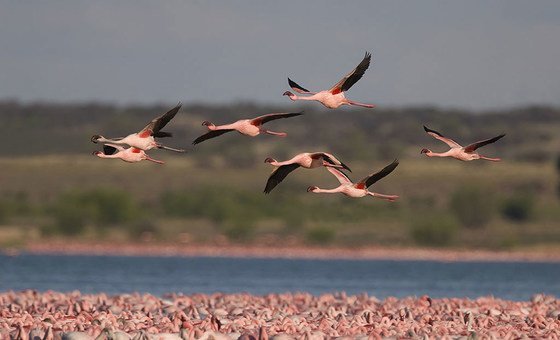As they make their global journeys, migratory birds not only set birdwatchers’ binoculars agog, they also help the planet maintain its essential ecological balance.
That’s one of the key messages from United Nations chief Antonio Guterres, for World Migratory Bird Day, celebrated on Saturday, with the soaring message: “Unifying Our Voices for Bird Conservation.”
“Migratory birds connect people, ecosystems and nations. They are symbols of peace and of an interconnected planet,” Secretary-General António Guterres said in a statement to mark the Day.
“Their epic journeys inspire people of all ages, across the globe,” he continued, adding: “World Migratory Bird Day is an opportunity to celebrate the great natural wonder of bird migration – but also a reminder that those patterns, and ecosystems worldwide, are threatened by climate change.”
The Day highlights the need to conserve migratory birds and their habitats by raising awareness of the threats they face, their ecological importance and the need for international cooperation to conserve them.
Migratory birds fly hundreds and thousands of kilometres, along historic routes, to find the best habitats available for feeding, breeding and raising their young. The perilous journeys involve a wide and diverse array of threats.
Of the 11,000-bird species on the planet, one-in-five is considered migratory. Forty per cent of them are in decline, with one-in-eight under threat of global extinction. Major threats include habitat-loss and degradation, caused by agricultural and coastal development; collision with badly placed wind turbines and powerlines; unsustainable harvesting, and illegal killing and taking.
May 12: World Migratory Bird Day
Migratory birds are also greatly affected by poisoning, such as through ingesting lead released into the environment, through spent ammunition, or toxic weights used for fishing.
“Migratory birds are under threat from every corner: they are losing their habitats, subjected to illegal killing and suffering from the impacts of climate change,” said Erik Solheim, Executive Director of the UN Environment Programme, UNEP, adding that we all have a responsibility to “save such a precious component of the natural world.”
By protecting them, we protect our planet.
Key supporters and partners globally, are adamant that successful migratory bird conservation can only be achieved through a united effort.
Beginning this year, World Migratory Bird Day will be observed annually each May and October, to coincide with the cycle of migration, making it possible to organize events in countries around the world at peak migration times.
“I urge Governments and people everywhere to take concerted conservation action that will help to ensure the birds’ survival – and our own,” the Secretary-General concluded.

